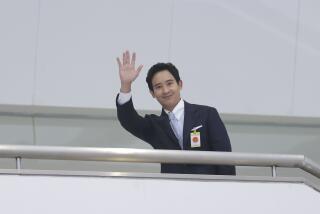POLITICS : Revered Thai Prime Minister Bows Out Without Regrets
- Share via
BANGKOK, Thailand — No matter who emerges as prime minister after Thailand’s national elections Sunday, the nation’s most respected leader won’t be in the government.
“I’m not cut out to be a public figure,” outgoing Prime Minister Anand Panyarachun said in an interview Friday night as his second brief term as Thailand’s highly popular head of government drew to a close.
Many Thai commentators have described Anand as the most effective leader in modern Thai history. His governments have displayed enormous energy in enacting long-delayed reforms and have been marked by an absence of the corruption that often taints public office in Thailand.
Unusual for a public figure anywhere, Anand longs for the days when the phone will stop ringing and he will no longer be on television every night dealing with a new crisis. “Politics is not in my heart,” he said.
A former diplomat, Anand was first appointed to his post in February, 1991, when a bloodless coup by the Thai military ousted Chatchai Choonhavan, the last elected prime minister in the country.
Anand, 60, was reappointed last May after pro-democracy demonstrations and the killing of more than 50 demonstrators by the army led to the resignation of Suchinda Kraprayoon, an army general who had been appointed prime minister by a coalition of military-backed political parties.
“Anand deserves a medal for the way he has handled the government,” said a Western diplomat.
British-educated Anand, with an unmistakable patrician bearing, is revered by Thais as an aristocrat who is above the slings and arrows of elective politics. That he is also, as a wealthy private businessman, aloof from the man in the street does not seem to have hurt his popularity.
Among his achievements since the May demonstrations have been steps to tame the restive military’s threat to curtail civilian control. The generals have staged 19 coups since Thailand became a constitutional monarchy in 1938 and have run a virtual parallel government, complete with their own foreign policy and television stations.
In August, Anand ordered the demotion of two senior military officials who were alleged to have been responsible for the brutal suppression of pro-democracy demonstrators--Supreme Commander Kaset Rojananil and army commander Issarapong Noonpakdee. In quick succession, he engineered small maneuvers to wean military leaders from positions of importance: Kaset was removed as chairman of Thai International Airways; other officers were stripped of powerful jobs in the state telephone monopoly and communications authority. He also abolished internal security laws that the military had used to justify intervening against the demonstrators.
“I’m quite confident they have come around to accept the normal and regular role of the armed forces,” Anand said. “There has been a basic change in attitude. Structural change in the armed forces has to be done on a long-term basis. It’s something which should not be imposed on them.”
Anand said there is no question that the army will accept the verdict of the polls Sunday, whereas in the past the result was often not assured. As usual in Thai elections, there is a smorgasbord of 2,417 candidates from 13 parties vying for 360 seats in the House of Representatives, the lower house of Parliament.
Anand’s government has strengthened Poll Watch, a monitoring agency that will deploy 60,000 volunteers to ensure the election’s fairness.
On Friday, King Bhumibol Adulyadej signed into law a constitutional amendment barring non-elected politicians from serving as prime minister, which Anand remarked with a smile will bar him from being drafted as Thailand’s savior again. He said that when he leaves office, he will resume his job as chairman of Saha-Union Corp., one of Thailand’s biggest conglomerates.
When asked about how he hopes history will remember him, the bashful prime minister replied: “I hope I will be forgotten.”
More to Read
Sign up for Essential California
The most important California stories and recommendations in your inbox every morning.
You may occasionally receive promotional content from the Los Angeles Times.













